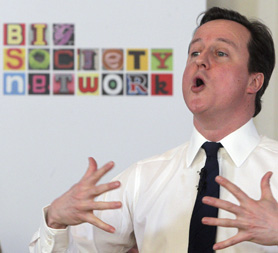Big Society ‘hit by spending cuts for charities’
One of the founders of the Big Society concept tells Channel 4 News that its image is being damaged by public spending cuts.

The accusation is that while he is striving for a State that does less and spends less, councils are cutting their grants to charities because their funding is being squeezed by the Government.
Today, the Prime Minister was blunt. There was “no area that should be, can be, really immune from the public spending problems that we face”.
At the same time, Mr Cameron spelled out where he thought the Big Society should be going. “If there are facilities that the state can’t afford to keep open, shouldn’t we try to encourage communities who want to come forward and help them?”
Funding
So where is the money coming from to support the Prime Minister’s plans? The Big Society Bank will receive £400m from dormant bank accounts and £200m from the high street banks, while a £100m transition fund will be created to help charities and social enterprises bid for Government contracts to provide services.
One of the people at today’s launch in London was Paul Twivy, co-founder of the Big Society Network. He is enthusiastic about what Mr Cameron is trying to do, but believes that making it work will be difficult while public spending is being cut.
“What concerns people is that libraries need to be run by professional librarians.” Paul Twivy, co-founder, Big Society Network
He told Channel 4 News that it was vital that the right message went out to people: that while volunteering was a good thing, they should not be expected to run professional services themselves.
“What has dominated the agenda is the idea of volunteering and the idea that voluntary groups can take over public services. What concerns people is that libraries need to be run by professional librarians and hospitals need to be run by trained medical staff.”
This “unhelpful stereotype” had caused concern: the suggestion that professionals could be “replaced by kindly but hapless volunteers”; that there would be a “shift from expertise to amateurism”.
Mr Twivy said he was encouraged that many free schools were being set up by people who knew about education – teachers. Asked how the average citizen could contribute to the Big Society, he said helping local charities was the key. Most of these organisations did not receive the assistance they needed, and would benefit from professional help. For example, an accountant could offer to help with the accounts.
John Bird, founder of the Big Issue, was also at the launch. He told Channel 4 News he had first discussed the Big Society with Mr Cameron about three years ago, and the Tory leader had been talking about it “a few years before that”.
‘Not a Trojan horse’
That was why it was wrong to assume it was simply a “Trojan horse for cuts”. Mr Bird said: “It is in a sense like two buses going to the bus stop at the same time and banging into each other.”
Based on his own area of poverty alleviation and homelessness, the state was not as efficient or effective as charities. “The fact is that they’re not very good at getting people out of poverty …. because they continue to support them as victims.”
It was important to remember that public spending was not being decimated; it was simply being cut to the level it was in 2007, but councils were hitting the charitable sector instead of cutting their own costs. “We can’t go back to a big state. Most councils have put on a lot of fat in the last few years.”
Mr Bird said the problem was that councils were “cutting very badly” – and damaging the charitable sector.
Sir Stephen Bubb, chief executive of the Association of Chief Executives of Voluntary Organisations, told Mr Cameron: “Much of this is coming from local councils. I think you need to think about how you say to local councils the cuts they are making are disproportionate, they are hurting disadvantaged communities.”
Speaking to Channel 4 News, Sir Stephen said charities were being hit to the tune of £1bn this year, largely because of local authority cuts. He accepted that councils had to cut costs because they were receiving less money from the Government, but said the falls in income endured by the voluntary sector charities was disproportionate.
“I’m suggesting they don’t cut the third sector by a bigger proportion than they are cutting their own services.”
Councils have to make savings across the board. Local Government Association
In his spending review in October, Chancellor George Osborne announced cuts of 28 per cent for councils over the next four years, with the biggest reductions in the early years.
The Local Government Association said in a statement: “The severe and front-loaded Government cuts mean councils have to make savings across the board, and unfortunately funding to charities, voluntary organisations and community groups is not exempt from this.
“Councils value the key role the third sector plays in delivering statutory frontline services, like child and adult care, and these organisations will still be funded as best they can.
“But town halls have also to provide a raft of other frontline services such as refuse collection, flood defence and road maintenance, and a smaller pot of money from which to fund them all. On top of direct funding cuts, councils are having to contend with the loss of grants which were used to help the third sector, such as the Working Neighbourhoods Fund.”




